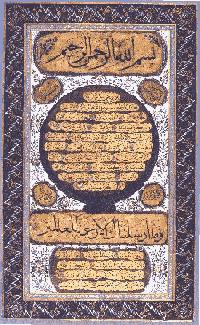Al-Kafirun
| الكافرون Al-Kāfirūn The Disbelievers | |
|---|---|
| Classification | Meccan |
| Other names | Atheists, The Unbelievers |
| Position | Juzʼ 30 |
| No. of verses | 6 |
| Quran |
|---|

Sūrat al-Kāfirūn (Arabic: سورة الكافرون, "The Unbelievers") is the name of the 109th Sura (chapter) of the Qur'an.
Like many of the shorter surahs, the surah of the Unbelievers takes the form of an invocation, telling the reader something they must ask for or say aloud. Here, the passage asks one to keep in mind the separation between belief and unbelief both in the past and the present, ending with the often cited line "To you your religion, and to me mine". Although some view this as an argument against religious intolerance, others see it as a more time-specific revelation, warning the newly founded Muslim minority in Mecca against being induced (by the Quraish majority) to collude with disbelievers. "Wahb bin Munabbih has related that the people of Quraish said to Allah's' Messenger: 'If you like we would enter your faith for a year and you would enter our faith for a year.'"(Abd bin Humaid, Ibn Abi Hatim). [1] In this latter view, from time to time the Quraish leaders would visit Muhammad with different proposals of compromise so that if he accepted one of them the dispute between them would be brought to an end.
It was revealed in Mecca when the Muslims were persecuted by the polytheists of Mecca.
As for the esteem in which Muhammad held this surah, it can be judged from the following few hadith:
- Hadrat Abdullah ibn Umar has related that on many an occasion he heard Muhammad recite Surahs Qul Ya- ayyuhal- kafirun and Qul Huwu-Allahu ahad in the two Rakats before the Fajr obligatory Prayer and in the two rakahs after the Maghrib obligatory Prayer.[2]
- Hadrat Khabbab ibn al-Aratt says: "The Holy Prophet (upon whom be peace) said to me: when you lie down in bed to sleep, recite Qul ya-ayyuhal kafirun, and this was the Holy Prophet's own practice also; when he lay down to sleep, he recited this Surah."[3]
- According to Ibn Abbas, Muhammad said to the people: "Should I tell you the word which will protect you from polytheism? It is that you should recite Qul ya-ayyuhal kafirun when you go to bed."[4]
- Hadrat Anas says that Muhammad said to Hadrat Mu'adh bin Jabal; "Recite Qul ya-ayyuhal-kafirun at the time you go to bed, for this is immunity from polytheism." [5][6]
- Both Fardah bin Naufal and Abdur Rahman bin Naufal have stated that their father, Naufal bin Muawiyah al-Ashjai, said to Muhammad: "Teach me something which I may recite at the time I go to bed." Muhammad replied: "Recite Qul ya-ayyuhal kafirun to the end and then sleep, for this is immunity from polytheism." [7] A similar request was made by Hadrat Jabalah bin Harithah, brother of Hadrat Said bin Harithah, to Muhammad and to him also he gave the same reply.[8]
- Messenger of God recited in the two Rakahs before the morning prayer and the two Rakahs after the Sunset prayer on ten or twenty different occasions: Say O' al-Kafirun and say He is God, the One (surah 112: al-Ikhlas).[9]
References
- ^ The Noble Quran https://quran.com/109
- ^ Several traditions on this subject with a little variation in wording have been related by Imam Ahmad, Tirmidhi, Al-Nasa'i, Ibn Majah, Ibn Hibban, Ibn Marduyah from ibn Umar.
- ^ Abu Bakr Al-Bazzar, Al-Tabarani, Ibn Marduyah
- ^ Abu Ya'la, Al-Tabarani
- ^ Al-Bayhaqi in Ash-Shu'ab
- ^ Abu Dawud: 4396 & Hakim ibn Hizam 1/565
- ^ (Musnad Ahmad, Abu Dawud, Tirmidhi, Al-Nasa'i, Ibn Abi Shaibah, Hakim ibn Hizam, Ibn Marduyah, Al-Bayhaqi in Ash-Shuab).
- ^ (Musnad Ahmad, Al-Tabarani).
- ^ Imam Ahmad recorded from ibn Umar
External links
109 (Al-Kafirun)
